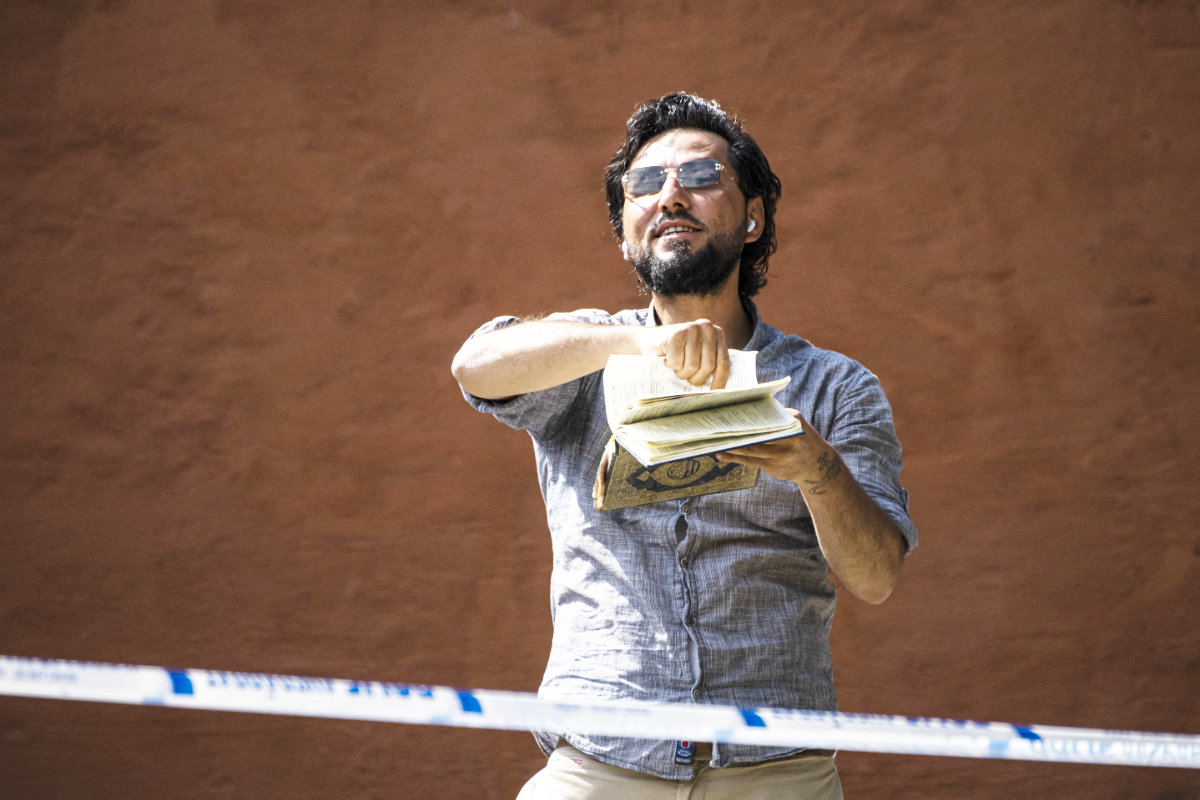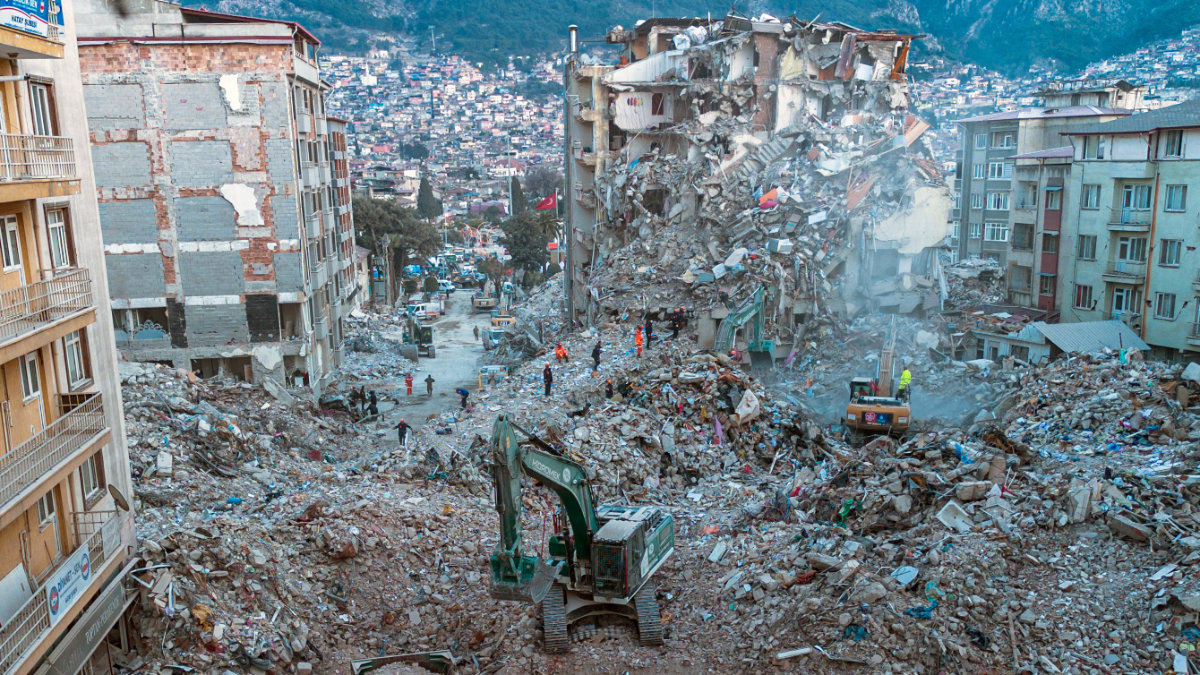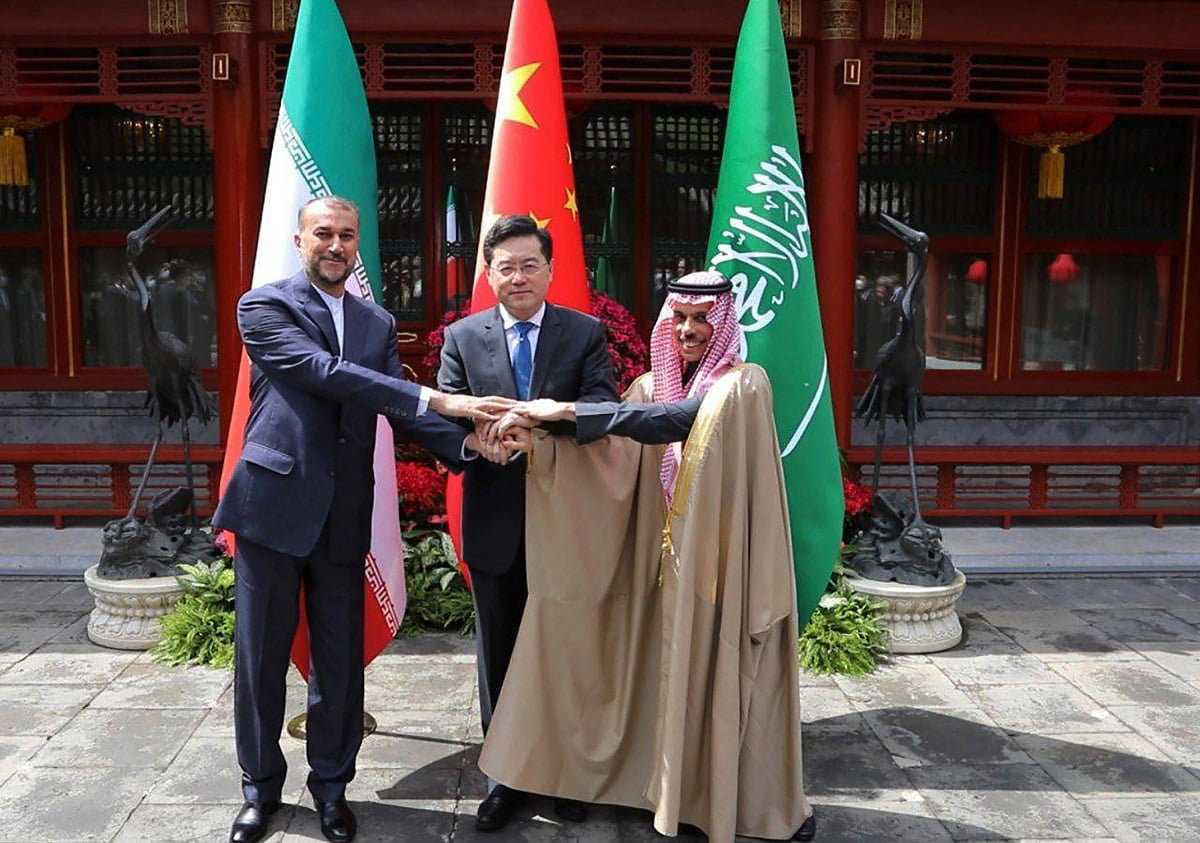IRBIL, Iraqi Kurdistan: The Middle East and North Africa region has witnessed another tumultuous year, marked by events ranging from the worst earthquake of the century to the bloodiest chapter yet of the Israeli-Palestinian conflict.
At the same time, however, the year has also seen promising signs of reconciliation between old rivals and foes as well as progress on tackling the causes and mitigating the effects of climate change.
JANUARY
Qur’an burnings
The burning of a copy of the holy Qur’an by far-right agitators outside the Turkish Embassy in the Swedish capital, Stockholm, on Jan. 21 ignited furious protests across the Islamic world.

The burning of a Quran in Sweden by far-right agitators sparked protests in Muslim communities around the world, including the Middle East. (AFP)
While demonstrations in Bahrain, Jordan, and Lebanon were peaceful, supporters of Iraqi cleric Muqtada Al-Sadr clashed with police as they attempted to attack the Swedish Embassy in Baghdad.
The Sadrists would mount subsequent protests in July following additional Qur’an burnings in Sweden and Denmark, attacking the Swedish Embassy in Baghdad and attempting to storm the city’s Green Zone to attack the Danish Embassy.
Earlier this month, by a 94-77 vote, Denmark passed what is known as the Qur’an law, which bans the “inappropriate treatment” of religious texts. Offenders now face a fine or up to two years in jail.
FEBRUARY

An enormous 7.8 magnitude earthquake devastated parts of Turkiye and Syria killing over 50,000 in the former and 8,000 in the latter.(AFP)
Turkiye-Syria earthquakes
Two earthquakes caused havoc on an unprecedented scale in southern Turkiye and northern Syria on Feb. 6, killing more than 50,000 in the former and 8,000 in the latter.
The quakes — the worst Turkiye had witnessed since 1939 — were felt as far away as Egypt and Turkiye’s Black Sea coast.
While devastating, the disaster did contribute to notable improvements in regional diplomatic relations. Late in the month, Egypt’s foreign minister visited Syria and Turkiye for the first time in more than a decade.
Several regional governments also delivered humanitarian aid to Syria, leading to a thaw in relations with the hitherto isolated government in Damascus.
MARCH

In a landmark deal brokered by China, Iran and Saudi Arabia agreed to reopen embassies and resume diplomatic relations, which had been severed since January 2016. (AFP)
Saudi-Iran deal
March 10 would see further reconciliation in the region with Saudi Arabia and Iran agreeing to restore diplomatic relations and reopen their respective embassies as part of a deal brokered by China.
Having severed ties in 2016, the two countries marked an important turning point with this move, especially given Tehran’s long-running support for militia proxies throughout the region, including the Houthis in Yemen.
The development renewed hopes that many of the Middle East’s lingering disputes involving proxy armies could finally see peaceful resolution.
APRIL
Sudan conflict
After years of instability following the overthrow of long-time ruler Omar Bashir in 2019, Sudan descended into civil war on April 15 amid clashes between the rival Sudanese Armed Forces and the paramilitary Rapid Support Forces.
The ongoing war has claimed the lives of approximately 10,000 people, displaced millions, and devastated the capital, Khartoum. It has also led to renewed fears of another genocide in the troubled Darfur region.
With ceasefire talks making scant progress and global attention fixated on the wars in Ukraine and Gaza, the conflict in Sudan has become a neglected crisis that nonetheless threatens wider regional security.
MAY
Syria returns to the Arab fold
Foreign ministers from Arab League member states gathered on May 8 at the organization’s headquarters in Cairo and voted to reinstate Syria — a country that had long been a pariah on the world stage.
Syria’s Arab League membership was revoked following a deadly regime crackdown on anti-government protesters in 2011, which later escalated into an all-out civil war.
Although the conflict is not yet fully resolved, the thaw marks an important step toward the reconstruction of shattered infrastructure and ending the hardship of millions of displaced Syrians.
JUNE
Turkiye-PKK conflict intensifies
On June 13, the Kurdistan Workers’ Party, more commonly known by its acronym PKK, ended a unilateral ceasefire it put in place with the Turkish state following the February earthquakes.
In response, Turkiye dramatically increased strikes against the group’s hideouts in Iraqi Kurdistan, along with targeted assassinations against its leadership.
The leftist guerilla group has led a decades-old insurgency against the Turkish state with a view to creating a semi-autonomous Kurdish state in southeast Turkiye.
JULY
Protests in Israel
Israel’s parliament, the Knesset, passed the first bill of the controversial judicial overhaul pushed forward by Prime Minister Benjamin Netanyahu on July 24.
The bill’s ratification came despite widespread domestic protests in Israel since the start of the year and calls from US President Joe Biden to postpone it.
In an unprecedented move, thousands of reservists in the Israeli military warned they would stop reporting for duty if the bill was passed.
However, the government’s apparent determination to power ahead with its controversial overhaul was tempered by the Oct. 7 attack.
AUGUST
New Syria protests
While 2023 saw the Syrian government’s gradual reintegration into the Arab fold, the situation in the country remained dire for many of its citizens.
On Aug. 17, Syrians in the southern Druze-majority city of Suweida began protesting against the country’s debilitating economic conditions and record-high inflation.
The protests quickly spread, leading to renewed calls for the removal of President Bashar Assad — the most open criticism of his regime since the 2011 uprising.
August also saw unprecedented clashes in Syria’s east after the Kurdish-led Syrian Democratic Forces arrested an Arab leader of the Deir ez-Zor Military Council.
The clashes came after months of protests by Arab tribes against SDF policies and the lack of essential services in the oil-rich province, exposing the vulnerability of the US-allied, semi-autonomous region.
SEPTEMBER
Morocco and Libya
September was a particularly tragic month for North Africa. On Sept. 8, an earthquake devastated Morocco’s Marrakesh-Safi region, killing almost 3,000 people and destroying several of Marrakesh’s historic landmarks.
It was the second-deadliest earthquake of the year following the February quakes in Turkiye and Syria.
Then, on Sept. 9, Storm Daniel passed through eastern Libya, bringing devastating floods, which caused two dams to collapse on Sept. 11, sending 1 billion cubic feet (30 million cubic meters) of water into already inundated areas.
Derna in east Libya, home to around 90,000 people, suffered the worst of the resulting damage, with 25 percent of the city disappearing into the Mediterranean Sea.
OCTOBER-DECEMBER
Israel-Hamas war
October saw the start of the most destructive war between Israel and the Palestinian militant group Hamas in the Gaza Strip.
On Oct. 7, Hamas launched an unprecedented cross-border attack on southern Israel, killing more than 1,200 Israelis — most of them civilians — and kidnapping 240 Israeli and foreign nationals.
Israel responded with a devastating military operation, which has killed more than 20,000 Palestinians to date — the majority of them women and children. The Israeli offensive has triggered mass displacement of civilians and one of the biggest humanitarian disasters in recent memory.
NOVEMBER-DECEMBER
COP28
The 28th UN Climate Change Conference — COP28 — was hosted by Dubai from Nov. 28 to Dec. 12, welcoming almost 80,000 delegates and guests from around the world to discuss and seek solutions for the pressing challenges posed by climate change.


























